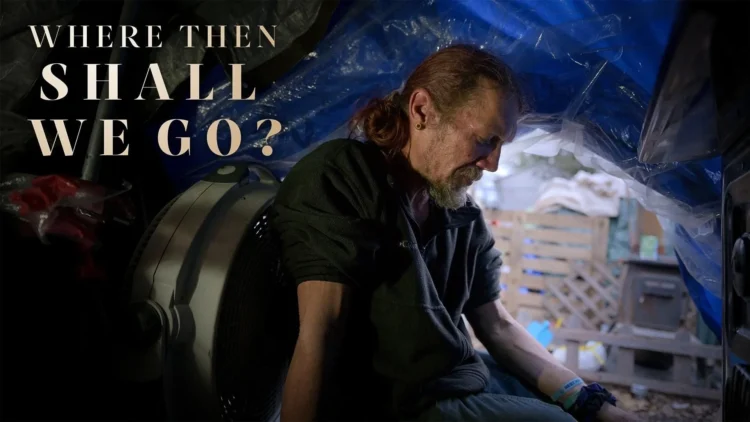HARTFORD, CT — Members of Connecticut’s End Homelessness Caucus gathered last week at the Legislative Office Building for a screening of Where Then Shall We Go?, a documentary capturing the everyday survival of unhoused individuals living at Rosette Neighborhood Village in New Haven.
The film, which follows the rise of a self-managed tiny home community, served as a stark backdrop to a candid, hour-long exchange between lawmakers, residents, and organizers.
Hosted by Rep. Lori Sweet, D-Hamden, and Rep. Kadeem Roberts, D-Stamford, the event placed a spotlight on Connecticut’s intensifying homelessness crisis. Advocates pointed to alarming local data — in Hamden alone, the number of unhoused individuals doubled in 2024.
“Homelessness isn’t cured by housing alone,” said Mark Colville, founder of Rosette Village and the Amistad Catholic Worker House. “It has to involve communities. We have a mythical shortage of resources here in this state and in our city.”
Colville criticized the current policy framework, arguing that New Haven Mayor Justin Elicker, who also appears in the documentary, continues to approach homelessness as an administrative issue, not as the pressing humanitarian emergency it has become.
Elicker, in his February State of the City speech, committed to developing 10,000 new housing units by 2034.
But Rosette Village residents told legislators that such long-term targets mean little when people are sleeping outside in sub-freezing temperatures, facing routine displacement by city sweeps.
Billy Bromage, lead organizer for the Unhoused Activist Community Team, emphasized the destructive impact of these municipal operations.
He said the removal of encampments strips individuals of their already scarce possessions.
“If we wait for the solutions, we’re going to be in a lot of trouble,” Bromage said. “People are outside. People are dying. We have to remember that those are the stakes.”
Healthcare professionals echoed the urgency, describing the near impossibility of offering stable, continuous care to individuals who are frequently moved and exposed to the elements.
Several attendees noted that even providing basic palliative services becomes unworkable under such conditions.
The discussion transitioned to legislation currently before the General Assembly.
Several lawmakers and advocates spoke in favor of House Bill 7033, which would bar municipalities from penalizing individuals for sleeping or camping on public land when no shelter space is available.
According to multiple speakers, the bill addresses a direct gap in current law that enables criminalization of poverty.
Attendees also expressed support for Senate Bill 1364, a proposal to fund the construction of 500 tiny homes for transitional housing.
The measure, backed by Sen. Saud Anwar, D-South Windsor, is part of a broader legislative push to support immediate housing solutions.
Rep. Susan Johnson, D-Windham, focused her remarks on what she described as unnecessary restrictions impeding housing development.
She called for reforming state historic preservation regulations, arguing that they artificially inflate renovation costs.
“Rehabilitating existing structures could rapidly expand Connecticut’s housing options,” she said, while also stressing the value of programs like Connecticut’s Housing Engagement and Support Services, which help medically fragile individuals remain housed.
At the intersection of policy and economics, Bruce Barrett, a small business owner who frequents Rosette Village, laid bare how market dynamics complicate the crisis.
“The market system teaches us as businesspeople how to leverage and make more money on lots of things — including housing,” Barrett said. “Big developers and brokers are constantly trying to sell me $3 million apartment buildings, telling me I can raise rents by 30% because they’ve done some renovations. Left unchecked, market forces do not guarantee everyone has housing. We have to actively counteract them.”
Some participants floated the idea of creating a formal “refugee status” for individuals experiencing homelessness, although no proposal was formally introduced. Still, the idea underscored the tone of the event — that the homelessness crisis is not only persistent but also escalating beyond existing frameworks.
The End Homelessness Caucus concluded the session with a call to move fast. Organizers and residents alike pressed legislators to prioritize laws that meet people where they are — not where policymakers hope they might be years from now.














